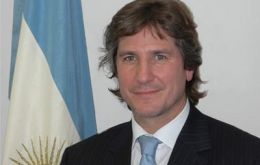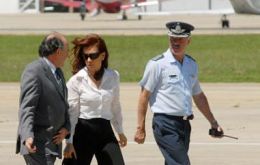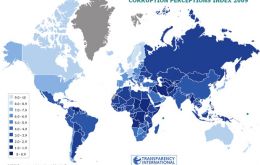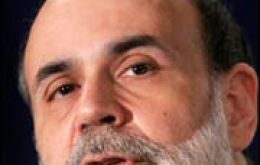MercoPress. South Atlantic News Agency
Economy
-
Thursday, November 19th 2009 - 13:18 UTC
Argentine Senate reopens debt restructuring process for bond holdouts

Argentina’s Senate passed a bill on Wednesday with a significant majority to reopen the country's 2005 debt restructuring. The administration of President Cristina Fernandez de Kirchner hopes it will help it settle a dispute with holders of an estimated 20 billion US dollars in defaulted bonds.
-
Thursday, November 19th 2009 - 06:38 UTC
Brazilian economy overcomes recession and expands at “Chinese rates”

Brazilian president Lula da Silva stated that Latinamerica’s largest economy not only has left the global crisis behind, but also in the third quarter has expanded at a “Chinese rate”, close to 9%.
-
Wednesday, November 18th 2009 - 09:30 UTC
Venezuelan economy forecasted to contract strongly in 2009

Venezuela's economy contracted 4.5% in the third quarter, far more than expected, and the second straight quarterly contraction this year after a drop in oil income affected public and consumer spending, the Central Bank said Tuesday.
-
Wednesday, November 18th 2009 - 04:10 UTC
Argentine fruit exports to Brazil loosing 300.000 USD per day

Argentine exporters claim they are loosing huge sums of money because of Brazilian delays at Customs posts and in extending import licences. This is particularly sensitive for fruit and other perishable exporters.
-
Wednesday, November 18th 2009 - 03:44 UTC
Cristina and Lula da Silva meet to address bilateral trade conflict

Argentina and Brazil presidents are scheduled to address trade disputes, Mercosur and other coming foreign policy issues when they meet Wednesday in Brasilia for their agreed regular contacts.
-
Wednesday, November 18th 2009 - 02:38 UTC
Chile and Uruguay, least corrupt in Latam and an inspiration for the region

Chile, Uruguay and Costa Rica have the lowest perceived levels of corruption in Latinamerica, a benchmark and inspiration for the Americas according to the latest report from Transparency International. Argentina and Venezuela are among the low performers in a region where there are serious indications of “rampant corruption”.
-
Tuesday, November 17th 2009 - 12:48 UTC
The Chilean currency at its highest in 16 months: 496 to the US dollar

The Chilean peso rose to its strongest level against the US dollar in 16 months after copper prices and global stocks rallied. The peso climbed 1.1% to 496.6 per dollar during trading and touched 494.15, the strongest since July 2008.
-
Tuesday, November 17th 2009 - 12:39 UTC
Federal Reserve working to “help ensure that the US dollar is strong”

United States Federal Reserve chief Ben Bernanke said Monday that US policymakers are mindful of the sliding US dollar. Bernanke said he is “attentive” to the decline in the currency and is working to “help ensure that the dollar is strong”.
-
Tuesday, November 17th 2009 - 01:02 UTC
Repsol cutting EP investment plans to reduce costs

Repsol-YPF, Spain’s biggest oil company cut its five-year exploration and production investment plan to reduce costs as the economic slowdown saps earnings. Repsol will invest an estimated 8.76 billion Euros in E&P from 2008 through 2012, down from an earlier plan to spend 9.3 billion Euros, the Madrid-based company announced Monday.
-
Monday, November 16th 2009 - 14:31 UTC
Controversy over Winnie-the-Pooh alleged unpaid royalties

The family of the man who made Winnie-the-Pooh famous in the US is suing Disney over alleged unpaid royalties. The late Stephen Slesinger, who signed a licensing deal with Pooh creator AA Milne in 1931, gave the bear his red shirt and developed Pooh products.
